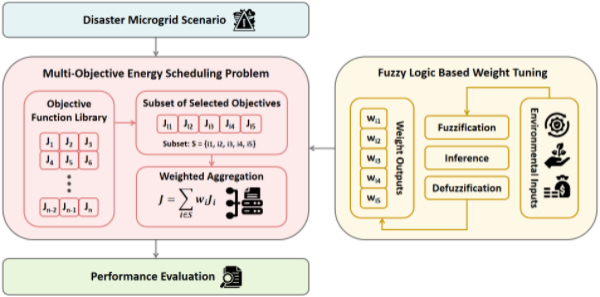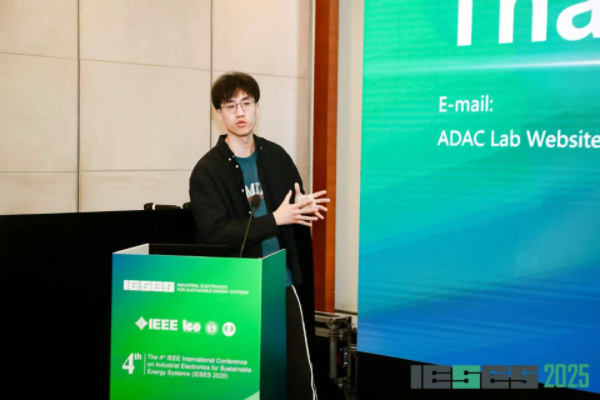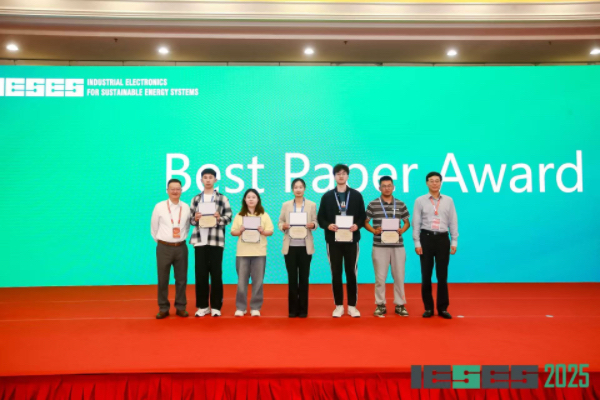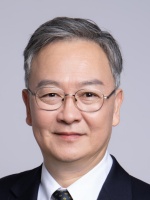A research paper from the Advanced Diagnosis, Automation, and Control Laboratory (ADAC Lab) at Shanghai Jiao Tong University Global College (SJTUGC, abbreviated as GC) has won the Best Paper Award at The 4th IEEE International Conference on Industrial Electronics for Sustainable Energy Systems (IESES 2025) held in Beijing from September 22 to 24. The paper titled “Multi-Objective Energy Scheduling with Fuzzy Logic-Based Weight Tuning for Disaster Relief” was first authored by GC master student Zhiyu Long under the supervision of Professor Mo-Yuen Chow, who served as the corresponding author.

Adaptive objective function framework proposed by the GC team
Natural disasters, such as earthquakes, typhoons and floodings, can have a catastrophic impact on the human society. Under such situations, effective and timely power supply is critical for supporting emergency response, medical services, communications, transportation, and other essential services. Microgrid technology can quickly incorporate distributed energy resources to provide local power supply in an islanding mode without reliance on the main grid, making it a promising solution for rapid power restoration after disasters. However, disaster environments are often highly dynamic and complex. The golden 72 hours rescue period and rapidly changing environmental conditions make microgrid energy management a highly time-sensitive task. One of the key challenges is how to properly adapt the objective functions under different operating conditions in this time-sensitive microgrid energy management to achieve timely responses.

Zhiyu Long presents the paper at the IESES 2025 conference

Zhiyu Long receives the Best Paper Award during the event.
To address this challenge, the GC research team proposed an adaptive objective function framework for disaster relief microgrids. An objective function library is first established, consisting of various objective functions designed for different disaster relief scenarios. From this library, multiple objectives are selected and combined into a single-objective optimization form through weighted aggregation, with the weight values representing their relative priorities. A fuzzy logic system, incorporating human expert knowledge as fuzzy rules, is then employed to adaptively assign appropriate weights to the selected objectives in response to the changing environmental conditions. Therefore, the priorities of different objectives can be automatically adjusted to reflect the latest disaster site conditions. Case studies have demonstrated the effectiveness of the proposed methodology in enhancing the adaptability of the microgrid energy management, making it well-suited for time-sensitive applications such as disaster relief.
Author Introduction

Zhiyu Long is a master student at Shanghai Jiao Tong University Global College. He received the B.S. degree in Automation from Southeast University in 2023. His research focuses on microgrid energy management, with an emphasis on distributed control, fuzzy logic, and optimization algorithms. He has published papers in international publications, including the IEEE/CAA Journal of Automatica Sinica (IF=19.2, ranked No. 1 worldwide in the JCR category of Automation & Control Systems).

Mo-Yuen Chow is a Professor, Doctoral Advisor, Director and Founder of the Advanced Diagnosis, Automation, and Control (ADAC) Laboratory at Shanghai Jiao Tong University Global College. He earned his degree in Electrical and Computer Engineering from the University of Wisconsin-Madison (B.S., 1982); and Cornell University (M. Eng., 1983; Ph.D., 1987). Professor Chow, who has joined Shanghai Jiao Tong University since 2022, is also an Emeritus Professor in the Department of Electrical and Computer Engineering at North Carolina State University. His recent research focuses on Dynamic Energy Management Systems, AI-Assisted Disaster Power Restoration, and Smart Battery Incipient Fault Detection, Diagnosis and Digital Twin. Professor Chow is an IEEE Fellow, the Co-Editor-in-Chief of IEEE Trans. on Industrial Informatics 2014-2018, Editor-in-Chief of IEEE Transactions on Industrial Electronics 2010-2012. He has received the IEEE Region-3 Joseph M. Biedenbach Outstanding Engineering Educator Award, the IEEE ENCS Outstanding Engineering Educator Award, the IEEE ENCS Service Award, the IEEE Industrial Electronics Society Anthony J Hornfeck Service Award, and the IEEE Industrial Electronics Society Dr.-Ing. Eugene Mittelmann Achievement Award. As a Distinguished Lecturer of IEEE Industrial Electronics Society, Professor Chow has been consistently listed among Stanford University’s top 2% of scientists worldwide. Over the course of his career, he has led and contributed to more than 38 government and industry-funded research projects. He holds 10 U.S. patents and has authored 347+ papers in reputed IEEE Transactions and leading international IEEE conferences.
